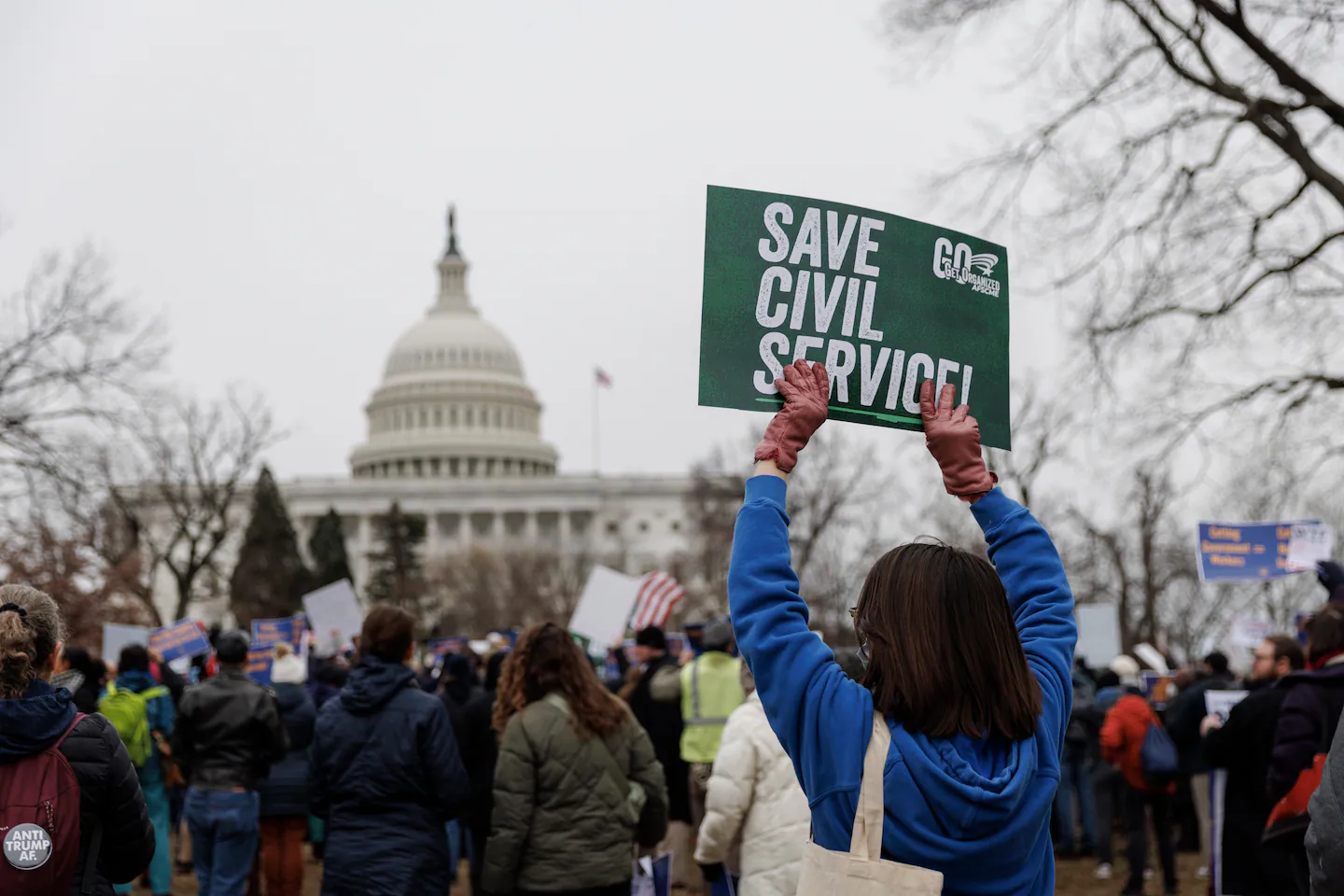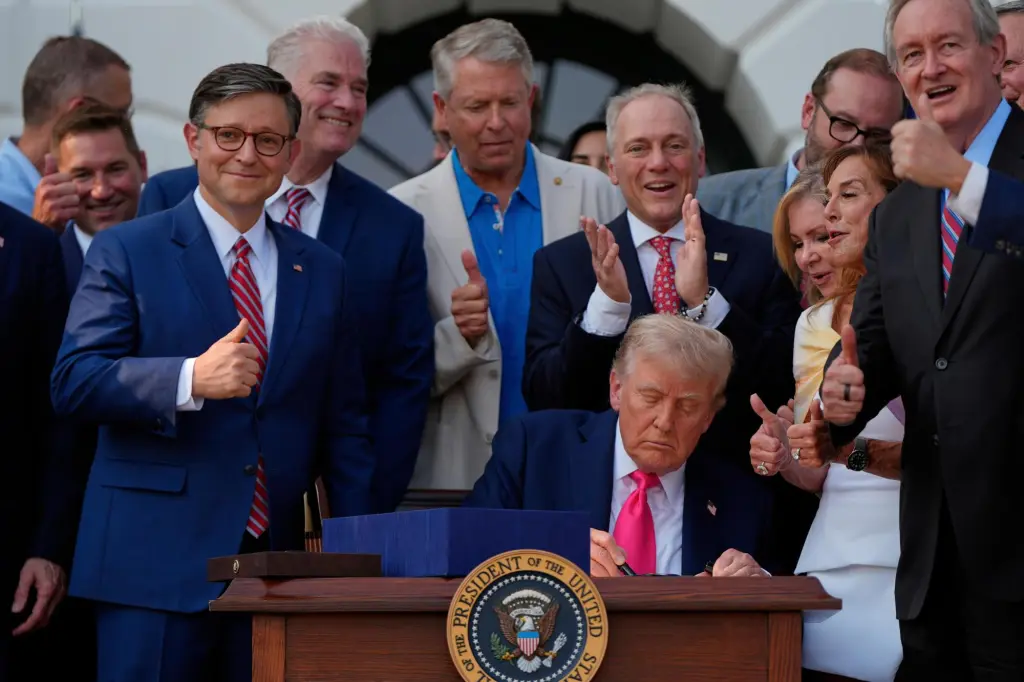
“I don’t take it lightly when I say that I think the shutdown is the lesser of the two evils we’re facing. I know what that means. I know what the consequences of that are,” said Jenna Norton, a program officer at the National Institutes of Health who went unpaid as a government contractor during the five-week shutdown in 2018. “But I also think the consequences of the status quo are much greater.”
The Globe spoke to a dozen federal employees around the country across 10 agencies about their views of a looming shutdown. They described a beleaguered workforce in which people feel they have no good options. Workers, including several who did not want to be named to avoid retaliation, said they are frustrated with being trapped in the middle of a political fight. But they’re also angered by how this administration has treated the federal bureaucracy and, in some cases, American democracy writ large.
Some are skeptical of Vought’s threat, citing the mass layoffs and dramatic changes the Trump administration has already unleashed. And they’re eager for Congress to send a message to the White House that federal workers cannot be ignored or disrespected.
Ellen Mei, a lead program specialist for the federal Supplemental Nutrition Assistance Program, under the Department of Agriculture, in its Northeast regional office in Boston, was one of the signers of a public letter released Monday urging Democratic congressional leaders to use the funding budget fight to reverse Trump administration budget cuts, even if it means a shutdown.
She said in an interview that she did not do so lightly.
“It’s really like the worst double-edged sword that we could be facing here,” said Mei, 29, who lives in Cambridge and has worked for five years for SNAP helping process food benefits to low-income families. ”In the short term, we know that this will cause some issues. But in the longer term, if we continue to see funding cuts, it just will hurt the population all the more.”
The letter was organized by the Federal Unionist Network, a coalition of federal unions and their allies. The organization said it wasn’t publicly releasing the signers, which also include 35 local, council, and national unions representing tens of thousands of federal workers, for fear of retaliation from the Trump administration.
Mark Histed, a scientist and researcher at the National Institutes of Health, said that the administration is already doing all of what it is threatening to do in a shutdown, including reductions in force and restricting the use of congressionally appropriated funds.
“The only way for this to stop is for Congress to do something,” Histed said. “I can only speak for myself, but I want NIH and US science to continue to be strong and lead the world, and we’re headed toward the destruction of that. And the only way out of this is for Congress to assert its power, and to say, ‘We appropriated money, we wrote into statutory law that NIH should be doing research … and right now that statutory mission in many ways is being harmed.’”
Other workers feel more torn. One who was already laid off this year is highly critical of the Trump administration, but he is also married to a current federal worker.
“I’m nervous about what the Trump administration is trying to do, but I also want Democrats to push back,” the fired worker said. “There’s no clear answer, and it’s frustrating how patriotic, non-partisan public servants are being held hostage by the Trump administration.”
Then there are workers who clearly oppose a shutdown, which will begin at 12:01 a.m. Wednesday if the Senate does not pass a so-called continuing resolution extending existing funding for seven weeks to allow lawmakers to craft a final budget.
Federal employees are like other Americans, living paycheck to paycheck, said Doreen Greenwald, president of the National Treasury Employees Union, which represents nearly 160,000 federal employees across 38 agencies. The shutdown threat has spread anxiety throughout those workplaces, she said.
“A shutdown serves no one, but it harms everyone, especially federal employees, who proudly report to work every day to serve their communities,” she said during a news conference outside the US Capitol Monday. She appeared with several Democratic lawmakers from Maryland and Virginia who introduced legislation to allow essential workers to be eligible for unemployment insurance during shutdowns.
Greenwald called for both parties to work together to avoid a shutdown.
Beth Willwerth, a 16-year Internal Revenue Service employee in an Andover office with 1,500 employees, doesn’t specifically blame Republicans or Democrats for the funding impasse. But she asserted that “federal employees feel like they’re just being used as pawns.”
Though she recognizes “this administration has been looking to fire federal workers since Inauguration Day,” Willwerth called Vought’s threat of widescale terminations during a shutdown “a scare tactic.”
A civil servant who works for the Administration of Children and Families under the Health and Human Services Department said the Trump administration has mismanaged the government and is doing real harm to its mission. But the worker also can’t abide by the ramifications of a shutdown for federal workers and American citizens. They don’t consider the threat of mass firings as empty at all, having already seen a wave of them in their agency. They’ve applied to private sector jobs for months and not had any success.
“I feel stuck,” the federal employee said. “What do we do as employees who need an income?”
As for a shutdown, the worker continued, “I don’t think this will get the administration’s attention in any way. And I think there is a great chance of mass civilian firings if the government were to shut down.”
An employee of Health and Human Services based on the West Coast is among those who expects to be required to continue working if the government is shut down. Despite that, he said, it will be difficult for him to do his job since it requires collaboration with workers who will likely be furloughed.
The employee, who described himself as “not a particularly progressive or conservative person,” expressed a desire for Democrats to make a deal with Republicans to keep the government funded. Part of the reason he transitioned to public sector work in the first place, he said, was for its former stability.
“People are just tired and sick to death of politics in general. The federal government should not be this exciting,” the HHS employee said. “This is not supposed to be reality television.”



